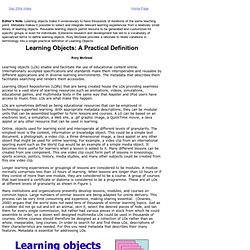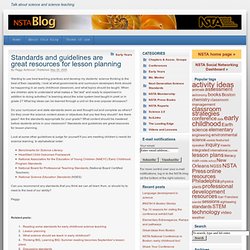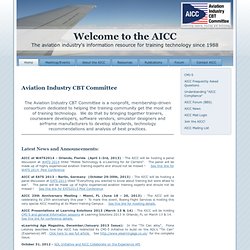

Learning Objects: Resources For Distance Education Worldwide. Stephen Downes Abstract This article discusses the topic of learning objects in three parts.

First, it identifies a need for learning objects and describes their essential components based on this need. Second, drawing on concepts from recent developments in computer science, it describes learning objects from a theoretical perspective. Finally, it describes learning objects in practice, first as they are created or generated by content authors, and second, as they are displayed or used by students and other client groups. The Need for and Nature of Learning Objects Some Assumptions and a Premise Before launching directly into a discussion of learning objects, it is important to examine some assumptions and a premise. Now for the premise: the world does not need thousands of similar descriptions of sine wave functions available online. Suppose that just one description of the sine wave function is produced. The economics are relentless.
Sep04_02. Editor’s Note: Learning objects make it unnecessary to have thousands of iterations of the same teaching point.

Metadata makes it possible to select and integrate relevant learning experiences from a relatively small library of learning objects. Reusable learning objects permit lessons to be generated and customized for specific groups or even for individuals. Extensive research and development has led to a vocabulary of specialized terms to define learning objects. Rory McGreal provides a rationale to relate variations in terminology into a single practical definition of Learning Objects. Rory McGreal Learning objects (LOs) enable and facilitate the use of educational content online. Learning Object Repositories (LORs) that are being created house the LOs providing seamless access to a vast store of learning resources such as animations, videos, simulations, educational games, and multimedia texts in the same way that Napster and IPod users have access to music files.
GuiaEstandares.pdf (application/pdf Objeto) Openacs08_lm-drm-or-mja-ocs-jgb.pdf (application/pdf Objeto) Session6.1.pdf (application/pdf Objeto) EUROPA. eLearning_Interoperability_Standards_wp.pdf (application/pdf Objeto) TEREC - T&E Tools. Kirkpatrick 4 Levels : Model of Training Evaluation : ROI : Evaluating Training Programs : Donald Kirkpatrick Model : Four Levels : Kirkpatrick Partners. Macromedia - eLearning : Standards. Advanced Distributed Learning: Home Page. Io's Instructional Management System (IMS)
Learning Object Standards: Why Standards? What are the LO Standards? ARIADNE - A guideline for Internet based guidance.: Start page. Welcome to IMS Global Learning Consortium. Metadata and Learning Object Standards: IMSmanifest, LOM, Dubling Core Metadata Element Set. DCMI Home: Dublin Core® Metadata Initiative (DCMI) Standards and guidelines are great resources for lesson planning. Wanting to use best teaching practices and develop my students’ science thinking to the best of their capability, I look at what governments and curriculum developers think should be happening in an early childhood classroom, and what topics should be taught.

When are children able to understand what makes a “fair test” and ready to experiment in addition to doing activities? Is learning about the solar system best taught in preK or in grade 2? What big ideas can be learned through a unit on the ever popular dinosaurs? Do your curriculum and state standards seem as well thought out and complete as others? Do they cover the science content areas or objectives that you feel they should? Look at some other guidelines to judge for yourself if you are meeting children’s needs for science learning. Can you recommend any standards that you think we can all learn from, or should try to meet to the best of our ability? Peggy. Aviation Industry CBT Committee. The Aviation Industry CBT Committee is a nonprofit, membership-driven consortium dedicated to helping the training community get the most out of training technology.

We do that by bringing together trainers, courseware developers, software vendors, simulator designers and airframe manufacturers to develop standards, technology recommendations and analysis of best practices. Latest News and Announcements: AICC at WATS2014 - Orlando, Florida (April 1-3rd, 2013) : The AICC will be hosting a panel discussion at WATS 2014 titled “Mobile Technology & e-Learning for Air Carriers”. The panel will be made up of highly experienced aviation training experts and should not be missed ! See this link for WATS 2014 Pilot Conference AICC at EATS 2013 - Berlin, Germany (October 29-30th, 2013) : The AICC will be hosting a panel discussion at EATS 2013 titled “Everything you wanted to know about training but were afraid to ask”.